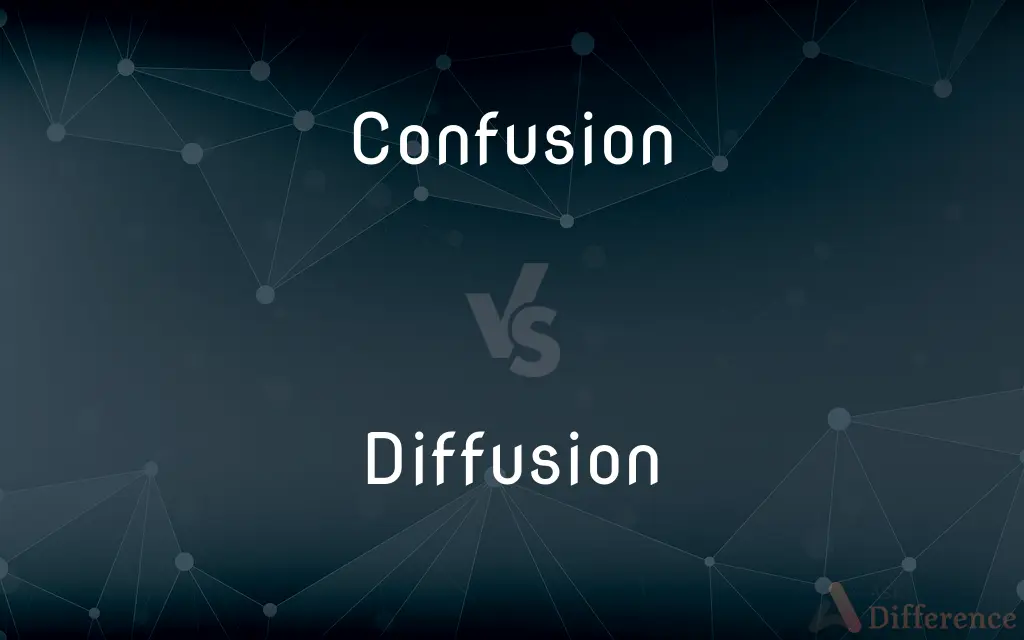Confusion vs. Diffusion — What's the Difference?
By Fiza Rafique & Maham Liaqat — Updated on March 21, 2024
Confusion refers to a lack of clarity or understanding, while diffusion is the process of spreading something more widely.

Difference Between Confusion and Diffusion
Table of Contents
ADVERTISEMENT
Key Differences
Confusion is characterized by a state of mental disarray or lack of understanding, often leading to uncertainty or inability to make decisions. On the other hand, diffusion is a physical process referring to the movement of molecules from an area of higher concentration to an area of lower concentration until equilibrium is reached.
While confusion is a subjective state affecting individuals' mental processes, diffusion is an objective, natural phenomenon observed in physical systems. Confusion impacts how information is processed and understood, often leading to errors or indecision. In contrast, diffusion is a predictable, quantifiable process that can be mathematically modeled and is crucial for understanding various natural and technological processes.
Confusion can be addressed and mitigated through strategies such as clear communication, education, and cognitive restructuring. These approaches aim to clarify misunderstandings and provide the necessary context or information to overcome confusion. In contrast, the process of diffusion can be influenced or controlled through physical means, such as changing temperature, pressure, or employing barriers, to achieve desired outcomes in scientific and industrial applications.
The experience of confusion and the process of diffusion, while vastly different in nature, both highlight the importance of clarity and understanding in their respective contexts. Confusion calls for effective communication and education to enhance understanding and decision-making, whereas understanding diffusion is essential for harnessing its principles in scientific research and practical applications.
Comparison Chart
Nature
Psychological state
Physical process
ADVERTISEMENT
Causes
Ambiguity, complexity, lack of information
Concentration gradients
Effects
Uncertainty, errors, indecision
Equilibrium, mixing, transport
Resolution strategies
Education, clarification, cognitive restructuring
Temperature, pressure changes, barriers
Fields of relevance
Psychology, education
Physics, chemistry, biology
Compare with Definitions
Confusion
A difficult situation.
Navigating through the new software was a confusion for many employees.
Diffusion
Cultural assimilation.
The diffusion of culinary traditions enriches global cuisine.
Confusion
State of perplexity.
Her confusion grew as the plot of the movie became more complex.
Diffusion
Spread of information.
Social media accelerates the diffusion of news.
Confusion
Disorder or disarray.
The sudden evacuation caused confusion among the attendees.
Diffusion
Spreading widely.
The diffusion of the new technology across industries was rapid.
Confusion
Lack of clarity.
The student's confusion was evident when he couldn't answer questions about the lecture.
Diffusion
Physical process in science.
Diffusion is crucial for the exchange of gases in the lungs.
Confusion
Mistaking one thing for another.
There was confusion between the identical twins at school.
Diffusion
Economic concept.
The diffusion of innovation theory explains how new ideas spread.
Confusion
In medicine, confusion is the quality or state of being bewildered or unclear. The term "acute mental confusion" is often used interchangeably with delirium in the International Statistical Classification of Diseases and Related Health Problems and the Medical Subject Headings publications to describe the pathology.
Diffusion
Diffusion is the net movement of anything (for example, atoms, ions, molecules, energy) from a region of higher concentration to a region of lower concentration. Diffusion is driven by a gradient in concentration.
Confusion
The act of confusing or the state of being confused
Backstage confusion made the rehearsal difficult.
Diffusion
The process of diffusing or the condition of being diffused
The diffusion of new technology around the world.
Confusion
An instance of being confused
"After his awakening to Chicano identity, he briefly mastered his inner confusions and found an articulate voice" (David C. Unger).
Diffusion
The scattering of incident light by reflection from a rough surface.
Confusion
(Psychology) A mental state involving impaired orientation with respect to time, place, or person.
Diffusion
The transmission of light through a translucent material.
Confusion
A lack of clarity or order.
Diffusion
The spontaneous intermingling of the particles of two or more substances as a result of random thermal motion.
Confusion
The state of being confused; misunderstanding.
Diffusion
The spread of linguistic or cultural practices or innovations within a community or from one community to another.
Confusion
Lack of understanding due to dementia.
Diffusion
The act of diffusing or dispersing something, or the property of being diffused or dispersed; dispersion.
Confusion
(archaic) A state of shame or embarrassment.
Diffusion
(physics) The scattering of light by reflection from a rough surface, or by passage through a translucent medium.
Confusion
The state of being mixed or blended so as to produce indistinctness or error; indistinct combination; disorder; tumult.
The confusion of thought to which the Aristotelians were liable.
Moody beggars starving for a timeOf pellmell havoc and confusion.
Diffusion
(physics) The intermingling of the molecules of a fluid due to random thermal agitation.
Gaseous diffusion
Confusion
The state of being abashed or disconcerted; loss self-possession; perturbation; shame.
Confusion dwelt in every faceAnd fear in every heart.
Diffusion
The spread of cultural or linguistic practices, or social institutions, in one or more communities.
Confusion
Overthrow; defeat; ruin.
Ruin seize thee, ruthless king,Confusion on thy banners wait.
Diffusion
(marketing) The gradual spread and adoption of goods or services.
Confusion
One who confuses; a confounder.
Diffusion
Exchange of airborne media between regions in space in an apparently random motion of a small scale.
Confusion
Disorder resulting from a failure to behave predictably;
The army retreated in confusion
Diffusion
The movement of water vapor from regions of high concentration (high water vapor pressure) toward regions of lower concentration.
Confusion
A mental state characterized by a lack of clear and orderly thought and behavior;
A confusion of impressions
Diffusion
The act of diffusing, or the state of being diffused; a spreading; extension; dissemination; circulation; dispersion.
A diffusion of knowledge which has undermined superstition.
Confusion
A feeling of embarrassment that leaves you confused
Diffusion
(physics) the process of diffusing; the intermingling of molecules in gases and liquids as a result of random thermal agitation
Confusion
An act causing a disorderly combination of elements with identities lost and distinctions blended;
The confusion of tongues at the Tower of Babel
Diffusion
The spread of social institutions (and myths and skills) from one society to another
Confusion
A mistake that results from taking one thing to be another;
He changed his name in order to avoid confusion with the notorious outlaw
Diffusion
The property of being diffused or dispersed
Diffusion
The act of dispersing or diffusing something;
The dispersion of the troops
The diffusion of knowledge
Common Curiosities
Why is diffusion important?
It's crucial for many natural processes, such as respiration and the mixing of substances.
How can confusion be resolved?
Through clear communication, education, and sometimes cognitive restructuring.
How does diffusion affect our daily lives?
It's involved in breathing, cooking, and even the spreading of ideas.
What's the difference between diffusion and osmosis?
Osmosis is diffusion of water across a semipermeable membrane, while diffusion doesn't require a membrane.
What causes confusion?
Confusion is caused by a lack of clarity, overwhelming information, or complexity.
How does culture influence diffusion?
Cultural acceptance and adaptation play significant roles in the diffusion of innovations or ideas.
What is diffusion in simple terms?
The process of substances spreading from areas of high concentration to low concentration.
Can confusion be a positive thing?
Yes, it can stimulate learning and problem-solving when resolved effectively.
Is diffusion only a physical process?
While primarily physical, it's also used metaphorically in social and informational contexts.
Can diffusion be harmful?
Yes, in cases like the spread of pollutants or diseases.
Can diffusion be controlled?
Yes, through environmental conditions like temperature and pressure.
What role does diffusion play in technology adoption?
It explains how new technologies spread and become mainstream.
Can confusion lead to creativity?
Yes, as seeking clarity can lead to innovative solutions and new perspectives.
How do educators address confusion in learning?
By simplifying concepts, using analogies, and ensuring clear communication.
Is confusion a sign of a problem?
It can be, especially if persistent, indicating a misunderstanding or cognitive issue.
Share Your Discovery

Previous Comparison
Responsibility vs. Remit
Next Comparison
Caliche vs. ClayAuthor Spotlight
Written by
Fiza RafiqueFiza Rafique is a skilled content writer at AskDifference.com, where she meticulously refines and enhances written pieces. Drawing from her vast editorial expertise, Fiza ensures clarity, accuracy, and precision in every article. Passionate about language, she continually seeks to elevate the quality of content for readers worldwide.
Co-written by
Maham Liaqat













































